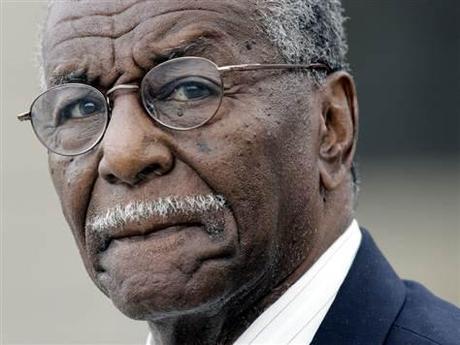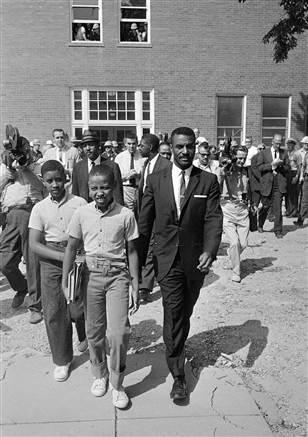The first is because the historic content demonstrates the significant difference between the black civil rights movement in this country, and the Tea Party, and the Wall Street protests. The protesters here are not armed, there is no implied or expressed threat of retaliation with violence against authority, only 1st Amendment action.
The second is because I have written before about racist attitudes, both subtle and overt. Being reminded of this history shapes the context in which we evaluate current events and attitudes of tolerance - and intolerance - like the Niggerhead / Perry controversy, or the political code language that equates urban thugs predominantly with blacks living in poverty-stricken sections of our cities.
Rest in peace, Reverend, and thank you for your courage, activism, and leadership. The nation is a better place because of your sacrifices and suffering.
From the AP and MSNBC.com:
Civil rights leader Shuttlesworth dies
Truck driver became pastor of Bethel Baptist Church in Birmingham
 Dave Martin / AP file Civil rights activist Rev. Fred Shuttlesworth, who was hailed by the Rev. Martin Luther King Jr. for his courage and energy, died Wednesday.
Dave Martin / AP file Civil rights activist Rev. Fred Shuttlesworth, who was hailed by the Rev. Martin Luther King Jr. for his courage and energy, died Wednesday. updated 1 hour 55 minutes ago BIRMINGHAM, Ala. — The Rev. Fred L. Shuttlesworth, who was bombed, beaten and repeatedly arrested in the fight for civil rights and hailed by the Rev. Martin Luther King Jr. for his courage and energy, has died. He was 89. Princeton Baptist Medical Center spokeswoman Jennifer Dodd confirmed he died at the Birmingham hospital Wednesday morning..
updated 1 hour 55 minutes ago BIRMINGHAM, Ala. — The Rev. Fred L. Shuttlesworth, who was bombed, beaten and repeatedly arrested in the fight for civil rights and hailed by the Rev. Martin Luther King Jr. for his courage and energy, has died. He was 89. Princeton Baptist Medical Center spokeswoman Jennifer Dodd confirmed he died at the Birmingham hospital Wednesday morning.. Shuttlesworth, a former truck driver who studied religion at night, became pastor of Bethel Baptist Church in Birmingham, Ala., in 1953 and soon was an outspoken leader in the fight for racial equality.
"My church was a beehive," Shuttlesworth once said. "I made the movement. I made the challenge. Birmingham was the citadel of segregation, and the people wanted to march."
 AP
AP Rev. Fred Shuttlesworth right, escorts Dwight Armstrong, 9, and his brother Floyd, 11, from the Graymont Elementary School in Birmingham, Ala, Sept. 9, 1963. State troopers, on order from the governor, opened the school but turned the African Americans away. In his 1963 book "Why We Can't Wait," King called Shuttlesworth "one of the nation's the most courageous freedom fighters ... a wiry, energetic and indomitable man."
He survived a 1956 bombing, an assault during a 1957 demonstration, chest injuries when Birmingham authorities turned fire hoses on demonstrators in 1963, and countless arrests.
"I went to jail 30 or 40 times, not for fighting or stealing or drugs," Shuttlesworth told grade school students in 1997. "I went to jail for a good thing, trying to make a difference."
He visited frequently and remained active in the movement in Alabama even after moving in 1961 to Cincinnati, where he was a pastor for most of the next 47 years. He moved back to Birmingham in February 2008 for rehabilitation after a mild stroke. That summer, the once-segregated city honored him with a four-day tribute and named its airport after him; his statue stands outside the Birmingham Civil Rights Institute. And in November 2008, Shuttlesworth watched from a hospital bed as Sen. Barack Obama was elected the nation's first African-American president. The year before, Obama had pushed Shuttlesworth's wheelchair across the Edmund Pettus Bridge in Selma during a commemoration of the Selma-to-Montgomery voting rights march.
In the early 1960s, Shuttlesworth had invited King back to Birmingham. Televised scenes of police dogs and fire hoses being turned on black marchers, including children, in spring 1963 helped the rest of the nation grasp the depth of racial animosity in the Deep South.
Referring to the city's notoriously racist safety commissioner, Shuttlesworth would tell followers, "We're telling ol' 'Bull' Connor right here tonight that we're on the march and we're not going to stop marching until we get our rights."According to a May 1963 New York Times profile of Shuttlesworth, Connor responded to the word Shuttlesworth had been injured by the spray of fire hoses by saying: "I'm sorry I missed it. ... I wish they'd carried him away in a hearse."
While King went on to international fame, Shuttlesworth was relatively little known outside Alabama. But he was a key figure in Spike Lee's 1997 documentary, "4 Little Girls," about the September 1963 Birmingham church bombing that killed four black children. PhotoBlog: Pictures of Fred Shuttlesworth
He also gained attention in Diane McWhorter's book "Carry Me Home: Birmingham, Alabama: The Climactic Battle of the Civil Rights Revolution," which won a Pulitzer Prize in 2002.
Shuttlesworth was born March 18, 1922, near Montgomery and grew up in Birmingham.
As a child, he knew he would either be a minister or a doctor and by 1943, he decided to enter the ministry. He began taking theological courses at night while working as a truck driver and cement worker during the day. He was licensed to preach in 1944 and ordained in 1948.
It was 1954 when King, then a pastor in Montgomery, came to Birmingham to give a speech and asked to stop by Bethel Baptist and meet Shuttlesworth. Shuttlesworth already knew the Rev. Ralph Abernathy, who became a key aide to King, as they both attended Alabama State College, later known as Selma University.
Meanwhile, in Montgomery, Rosa Parks refused to give up her seat on a city bus in late 1955, prompting the boycott led by King that gave new life to the civil rights movement.
In January 1956, King's Montgomery home was bombed while he attended a rally. Eleven months later, on Christmas night 1956, 16 sticks of dynamite were detonated outside Shuttlesworth's bedroom as he slept at the Bethel Baptist parsonage. No one was injured in either bombing, although shards of glass and wood pierced Shuttleworth's coat and hat, which were hanging on a hook.
The next day, Shuttlesworth led 250 people in a protest of segregation on buses in Birmingham.In 1957, he was beaten by a mob when he tried to enroll two of his children in an all-white school in Birmingham.
In Cincinnati, Shuttlesworth left Revelation Baptist Church and became pastor of the Greater New Light Baptist Church in 1966. He also founded a foundation to help low-income people make down payments on homes.
In 2004, he was president of the Southern Christian Leadership Conference for about three months. The troubled organization's board had suspended Shuttlesworth without giving a reason after he tried to fire a longtime official. He resigned, saying board members tried to micromanage the organization.
He was 84 when he retired as the pastor of Greater New Light in 2006. "The best thing we can do is be a servant of God," he said in his final sermon. "It does good to stand up and serve others."
